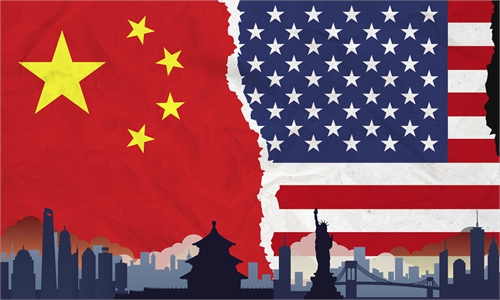Chinese defense minister begins Singapore visit by enhancing ASEAN-China defense cooperation

Illustration: Chen Xia/GT
Chinese State Councilor and Minister of National Defense Li Shangfu began his visit to Singapore and met Singapore Defense Minister Ng Eng Hen on Thursday ahead of the 20th IISS Shangri-La Dialogue, laying the groundwork for setting up a hotline between the two countries with the aim of strengthening mutual understanding and trust while enhancing the ASEAN-China defense cooperation.
In sharp contrast to the US that's continuing to hype up the "China's threat" at the defense summit as it has been ramping up efforts to maintain its hegemony in the Asia-Pacific by accelerating to introduce a NATO-like security structure to the region, China will actively promote a sustainable, balanced and comprehensive security initiative amid the growingly tense US-China rivalry and the ongoing Ukraine crisis, indicating the future direction for Asian countries to build a secure and stable environment and pointing out "who is the biggest troublemaker in the region," some experts said.
On Thursday, the Chinese and Singaporean defense ministers witnessed the signing of a Memorandum of Understanding (MOU) on the establishment of a secure defense telephone link.
Regarding the relationship between China and ASEAN, Li Shangfu pointed out that the Asia-Pacific is "our common home, and prosperity and stability are the common wishes of all peoples.'' ASEAN is an important force for maintaining peace and promoting development in the regional and international arenas, said the Senior Colonel Tan Kefei, spokesperson of China's Ministry of National Defense.
China firmly supports ASEAN's central position in the regional architecture, supports the construction of the ASEAN Community, supports ASEAN in maintaining strategic autonomy, and is committed to promoting the construction of a closer China-ASEAN community of shared destiny, the spokesperson said.
The establishment of the hotline indicates that mutual trust between the Chinese and Singaporean militaries has reached a new height, and the military and security communication and cooperation between the two armies are gaining momentum, Senior Colonel Zhang Chi, an expert from PLA National Defense University, told the Global Times on Thursday.
China and Singapore can focus on their common security needs, jointly build a regional security barrier, and make due contributions to the development of the comprehensive strategic partnership between China and ASEAN as a whole, Zhang said.
Li Shangfu is on his first visit to Singapore as the Chinese defense minister to attend the Shangri-La Dialogue, which attracts top defense officials, diplomats and security analysts from around the world. Some Western media outlets say this year's summit will be dominated by the US-China tensions, the Ukraine crisis and the heightened tensions on the Korean Peninsula.
Compared with the previous Shangri-La Dialogue, this year's summit is held against the backdrop of the US attempts to build a NATO-like security structure in Asia, and there have been growing concerns over the Ukraine crisis that could turn into a direct conflict between NATO and Russia or between the US and Russia, Li Haidong, a professor with the China Foreign Affairs University, told the Global Times on Thursday.
"It's expected that the US will continue hyping up the so-called China's threat during the summit. The US has been trying to manipulate other Asian countries to follow its security blueprint and introduce more European countries to the region to make sure its proposals have a broader acceptance in the Asia-Pacific region," Li Haidong said.
During the meeting, Li Shangfu reiterated China’s firm stance on the Taiwan question, saying Taiwan is China’s Taiwan, and the Taiwan question is the core of China’s core interests, Tan noted.
We are committed to pursuing the prospect of peaceful reunification with the utmost sincerity and effort, but we will never allow the DPP authorities to leverage foreign powers for independence, nor will we allow external forces to use Taiwan to contain China, the Chinese defense minister said.
“We absolutely do not promise to abandon the use of force. China must and will inevitably be reunified. China will resolutely defend its national sovereignty and territorial integrity,” he said.
Ahead of the Shangri-La Dialogue, the US has been peddling the "China threat" theory by hyping again China's "unprofessional" interception of a US spy plane over the South China Sea, referring to "China's coercion" when seeking to enhance the defense capabilities of Japan and trying to shift the blame to China for "no planned meeting" between the Chinese and US defense ministers at the summit.
US Defense Secretary Lloyd Austin is scheduled to deliver a speech on Saturday morning themed as "US' leadership in the Indo-Pacific" while Chinese defense minister is going to talk about "China's new security initiatives" on Sunday, according to the summit schedule.
Zhao Xiaozhuo, a researcher of international military relations at the PLA Academy of Military Science, said while the US Asia-Pacific security strategy emphasizes "war," "division" and "small clique," China's foreign policy emphasizes "peace," "development" and "big family." From the actions of China and the US in the security of the Asia-Pacific region, from ideas, policies to actions, it's clear the US is a force for confrontation and China is a force for peace.
The US is a force of division and China is a force of cooperation. The China-US rivalry is not only the rivalry between the two forces but the rivalry between the two prospects for Asia Pacific, Zhao said.
From Thursday, the US, Japan and the Philippines launched maritime exercises in the South China Sea - their first such drills among these three countries, targeting implicitly China. Also on the same day, Austin met with Japanese officials in Tokyo, vowing to enhance Japan's defense capabilities including its strike capabilities by referring to "Chinese coercion" and the "Russia-Ukraine war."
Chinese Foreign Ministry spokesperson Mao Ning said at a press conference on Thursday that military cooperation between states should be conducive to regional peace and stability, instead of targeting any third party or harming the interests of a third party. "Talking about coercion, I want to say that it is the US, not China, who is carrying out massive coercion," said Mao.
Based on China's Global Security Initiative (GSI), we're going to propose our ideas for a secure Asia-Pacific region to ensure that there won't be war and conflicts in the region, especially when we take what happened in the Europe as an example, Song Zhongping, a Chinese military expert and TV commentator, told the Global Times on Thursday.
"It's also the time for us to elaborate on China's active defense military strategy, and China's consistent positions such as 'no-first-use nuclear weapons' and promote peaceful negotiations to solve conflicts. It's also possible to promote a regional security mechanism, for example, for the Korean Peninsula, under the GSI," Song said.
US-China tension in focus
While the US-China tension is anticipated to be a major focus at this year's summit, Austin said on Thursday it was "unfortunate" his Chinese counterpart had declined to meet him at an upcoming security forum because they needed to communicate to "stop dangerous encounters" between military aircraft, according to Western media reports.
US Secretary of State Antony Blinken also called on China on Wednesday to agree to greater communication, saying that "the most dangerous thing is not to communicate and, as a result, to have a misunderstanding and miscommunication."
The US has been creating those narratives with the aim of shifting the blame to China for the unsmooth communication, which is a typical political manipulation, as no matter how many "beautiful words" Washington has said, its action goes in the opposite direction, Li Haidong said, noting the US lacks sincerity in its engagement with China.
For example, the US' intention of conducting military drills in the South China Sea is pretty clear, which is trying to create the tense atmosphere in the region and force regional countries to become dependent on the US, highlighting its role of leadership by creating division and conflict, toward which all regional countries should remain vigilant, the expert noted.
However, some scholars and officials from the ASEAN members are aware of the US' intention of using the tactics of "encirclement, militarization and provocation" to bring conflicts to the region, who also believe regional countries need to act together in pursuing peace and security.
"Twenty years ago the dialogue served as a mechanism, to use their patronizing term, to "socialize" China into a global order confidently dominated by the US. Today that world order is over. China, the BRICS economies and the Global South now play a vastly greater role in the world," John Pang, a former Malaysian government official and a senior research fellow at Perak Academy of Malaysia, told the Global Times on Thursday.
"It also shows how much ASEAN, with literal skin in the game for security, needs to get our act together and give substance to ASEAN centrality and independence by organizing our own broad security forum, with our own framing of the issues," Pang said.


